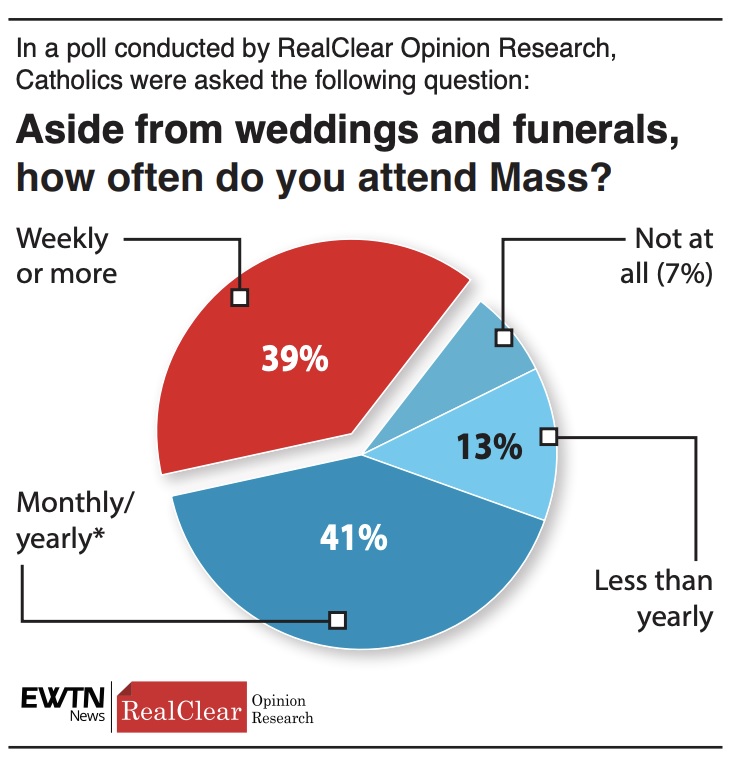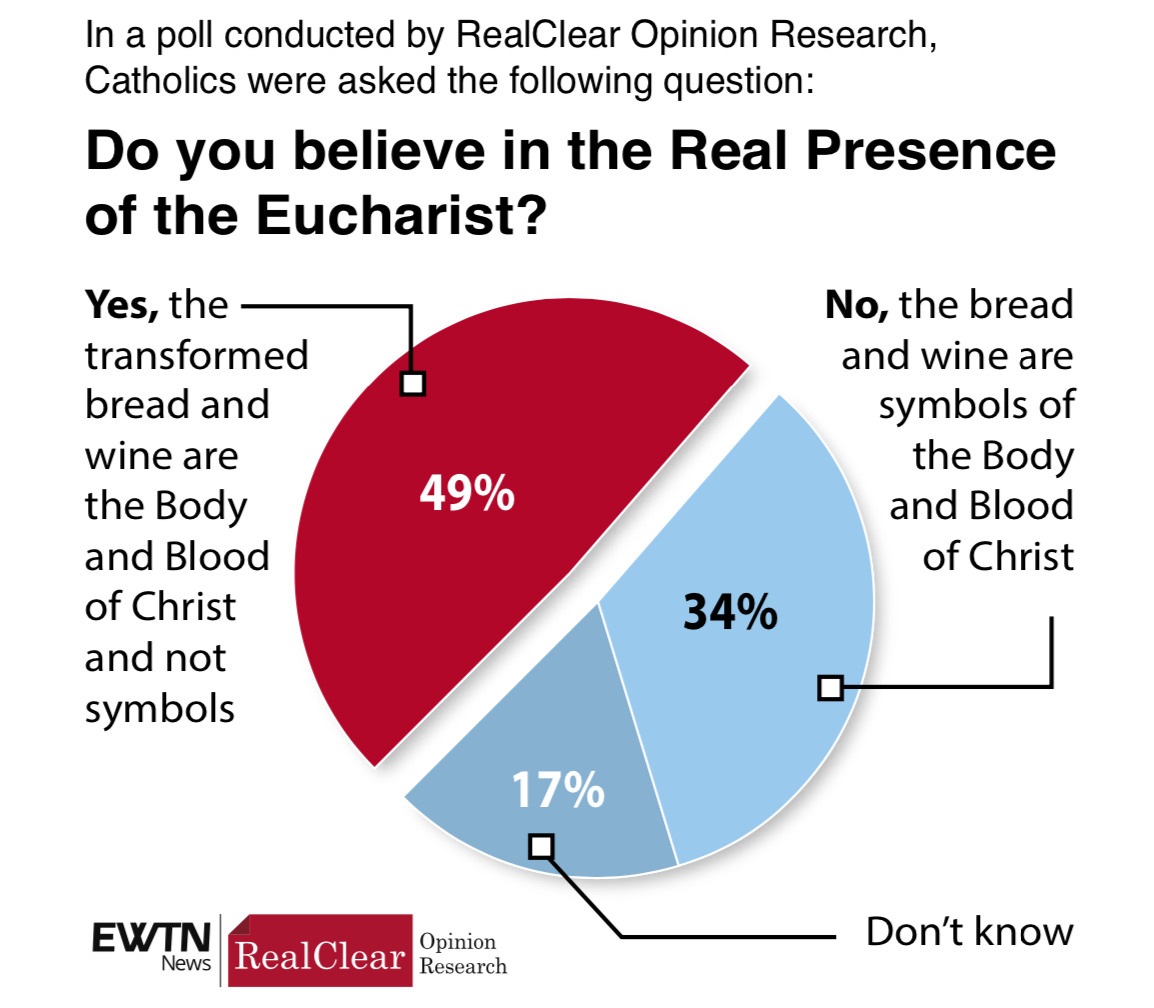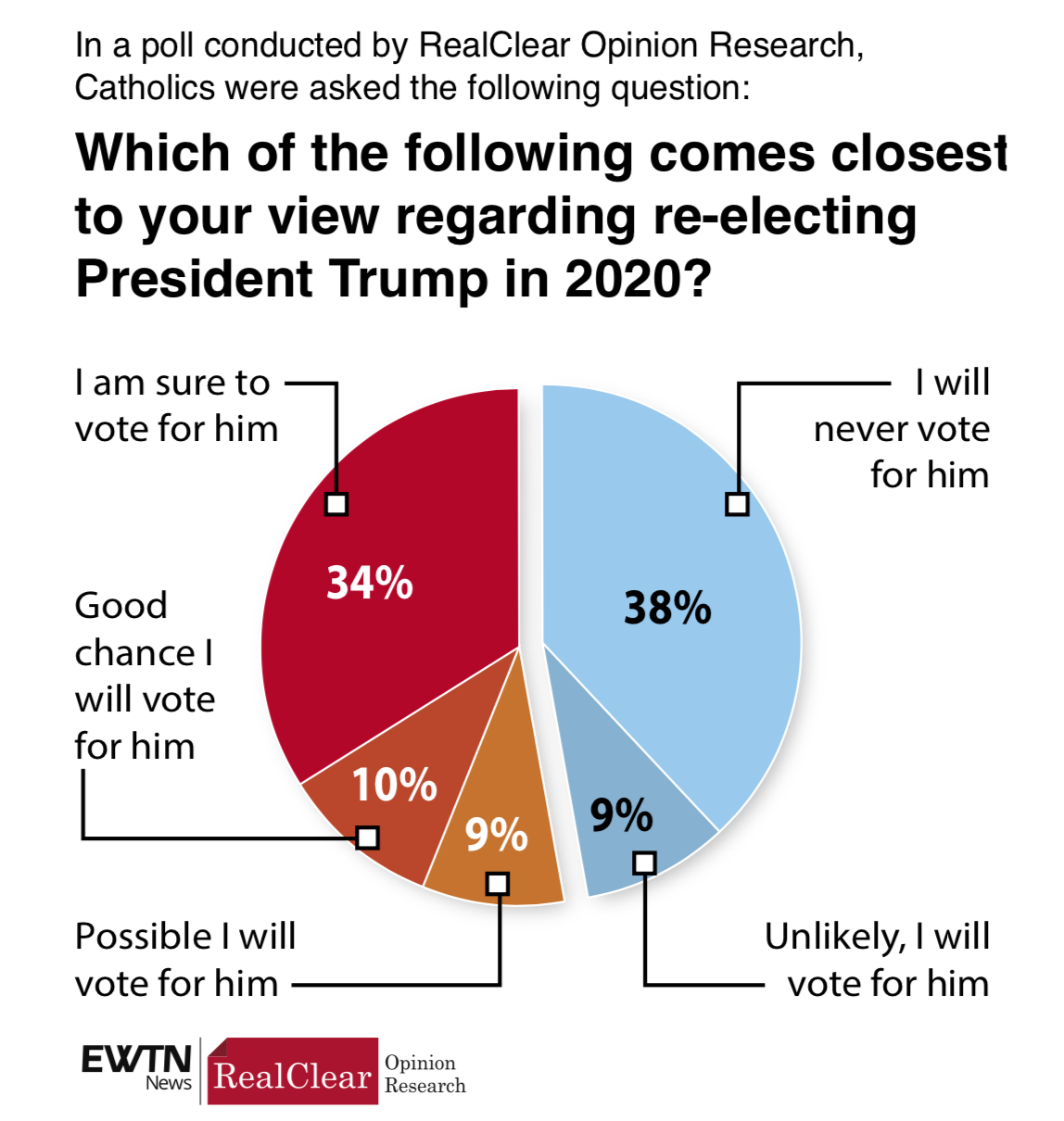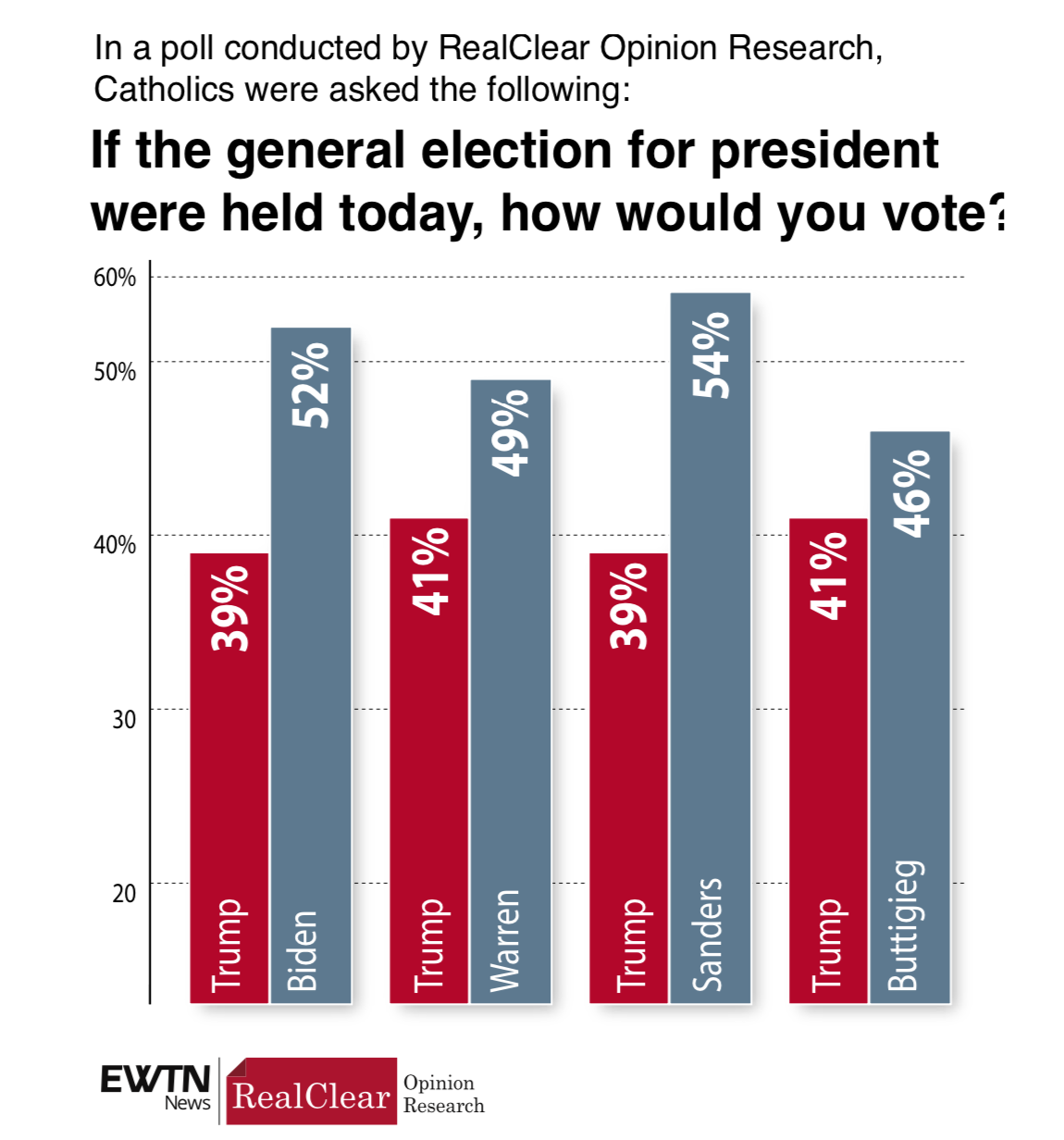EWTN News/RealClear Poll: Where US Catholics Stand
The new poll released today finds a deep divide between Catholics who are active in the practice of the faith and those who are not.

As Catholics in the United States head into an election year, and into a new decade, many questions are being asked about the state of the faithful — and a new poll released Dec. 9 provides powerful insights into this critical matter.
And among the most pressing questions are not only where Catholics stand on current political affairs, but also how they are living — or not living — their Catholic faith and how this guides their participation in American elections and culture.
To find out the answers, EWTN News and RealClear Opinion Research have partnered to conduct four opinion polls measuring the attitudes of Catholic voters, from one year out until the election, on a number of vital issues. The initial poll, released today, demonstrates that the 22% of voters who self-identify as Catholic is far from a monolith.
There are important differences between young and old Catholics, according to the new poll, just as there are critical distinctions between white Catholics and Hispanic/Latino Catholics. For faithful Catholics, however, the most notable differentiator could be the wide gap that exists between active or committed Catholics and those less influenced by the teachings of the Church.
The poll was conducted with adults 18 years of age and older residing in the contiguous United States. The sampling size was 2,055 U.S. registered voters, including an oversample of 1,223 Catholic voters, who were contacted online (English & Spanish) between Nov. 15-21, 2019. It has a credibility interval among registered voters of +/- 2.38 percentage points overall and among Catholic voters of +/- 2.66 percentage points at a 95% confidence level.
Deep Divide
The survey found that there is an enormous gulf in the area of belief and worship. In total, 58% of Catholic voters polled say that they accept all (17%) or most (41%) of the Church’s teachings; 25% admit that they do not accept some of the Church’s key teachings; 14% say that they are Catholic, but it only has a minor influence on their life; and 3% say they consider themselves former Catholics.
According to the findings, only 39% of all Catholics go to Mass at least weekly; 49% believe in the Real Presence; and a mere 13% go to confession at least once a year. Figures among the “most active” Catholics (defined as those who say they accept all or most Church teachings) are substantially higher; 66% of them believe in the Real Presence of the Eucharist; 56% attend Mass at least once a week; 52% go to confession at least once a year; and 49% pray the Rosary at least once a month.


By contrast, for those who accept only some key Church teachings, 31% believe in the Real Presence, 21% go to Mass at least weekly, 17% go to confession once a year, and 21% pray the Rosary at least monthly.
As might be expected, the figures are substantially lower yet for those who say their Catholic faith plays only a minor role in their lives, of whom 17% believe in the Real Presence, 10% go to Mass once a week or more, 9% go to confession at least once a year, and 7% pray the Rosary at least once a month.
Opinions on Trump
How all of that plays out politically is also stark. Active Catholics support President Trump overall, giving him a 52% job-approval rating (a level exceeded among the groups differentiated in the poll by evangelical Protestants at 60%). By comparison, Trump’s overall job approval is at 44% among all Catholics, 50% among all Protestants, and 42% among the general electorate.

And a combined 53% of active Catholics state that either they are sure to vote for Trump in 2020 (43%), or that there is a “good chance they will do so” (12%) — an overall level of support that again is matched only by evangelical voters.
Approval of Trump’s performance is far lower among the Catholics who accept some key teachings and those whose faith only plays a minor role, at 35% and 28% respectively. Similarly, in terms of the 2020 election, only 32% of those who accept some Church teachings say that they are sure to vote for him or that there is a good chance they will do so, while just 23% of those whose faith plays only a minor role are leaning towards Trump politically.

Nevertheless, when Catholic voters were asked who they’d vote for a year out from the election, in a contest of Trump against each Democrat contender, the embattled incumbent trailed. Even among active Catholics, a hypothetical race between Trump (46%) and Biden (46%) or Trump (47%) and Sanders (47%) showed voters completely divided.
Is There a Catholic Vote?
Catholics have been a crucial voting bloc in every election over the last 50 years, and 2016 was no exception. President Trump split the Catholic vote with Hillary Clinton, and it will be very difficult for him to win re-election without a similar level of support in 2020. But is there a Catholic vote?
This question is answered in different ways, but most political analysts and historians agree that in general self-identified Catholics have voted with the general electorate in almost all of the modern elections and that within the self-identified Catholic bloc there are major divisions by age, race and ethnicity and above all by levels of belief and practice.
One long-standing pattern is that young Catholic voters trend toward the Democrats while older Catholics tend to vote Republican. The EWTN/RCOR poll confirms this trend, finding that among 18- to 34-year-olds, 39% consider themselves liberal while 22% are conservative; among 55-year-olds and up, 45% see themselves as conservative and only 15% liberal. That affects how Catholics view President Trump’s job approval; currently, only 34% of young Catholics under 35 approve of Trump’s job performance, whereas 55% of older Catholics (55+) feel the same way.
“The difference between the generations is significant, and for the first time we’ll have more younger Americans, younger Catholics voting than older Catholics voting in 2020,” noted John Della Volpe, polling director of RealClear Opinion Research. “So that’s something that's worth keeping an eye on, as well.”
This poll also confirms the rising influence of Hispanic/Latinos on American Catholicism. Thirty-seven percent of Catholics in America are Hispanic, and they trend solidly 60% Democrat.
As with age, a substantial disparity also can be seen between Hispanic and non-Hispanic Catholics with respect to the president’s job approval. According to the findings, a majority (54%) of white Catholics approve of his performance, while less than a third (31%) of Hispanic/Latinos hold the same opinion.
The Decline of Religion and Sex-Abuse Crisis
Two areas at least of some agreement among Catholics in the U.S. are the impact of the clergy sexual-abuse crisis and the shrinking influence of religion and Christian values on American life.
Some 63% of American Catholics say that their trust in the leadership of the Catholic Church has been damaged by the clergy sex-abuse crisis. This is seen also in the fact that 55% of American Catholics disapprove of how the U.S. bishops have handled the abuse crisis. Pope Francis receives better marks, with 44% of American Catholics generally approving of how Pope Francis has handled the situation. These numbers underscore the immense pain and anger caused by the sex-abuse crisis and the failures and mismanagement by many Church leaders.
A majority of Americans (69%) and Catholics (70%) agree that people are becoming less tolerant of religion in America today. Equally, 62% of American Catholics believe that Christian values should play a more significant role in our society. These numbers extend across all levels of practice and ethnicity, although only 43% of young Catholics agree about the role of Christian values. In addition, 84% of all Americans and 86% of all Catholics still consider religion important in their own lives.
And, according to some analysts, a particularly striking aspect of the poll is that it confirms that the Church in the United States has failed in forming and catechizing two generations of Catholics, and there are wide gaps in practice and belief that influence every aspect of Catholic life.
“This is a failure of catechesis on the part of the Church that is massive,” professor Robert George of Princeton University told EWTN News Nightly. “So even if you take the most devout Catholic — those who believe all of what the Church teaches or most of what the Church teaches, only 66% of those believe in the Real Presence of Jesus in the Eucharist. You can’t get a more fundamental teaching to Catholicism.”
Matthew Bunson is a Register senior editor.
- Keywords:
- matthew bunson

















